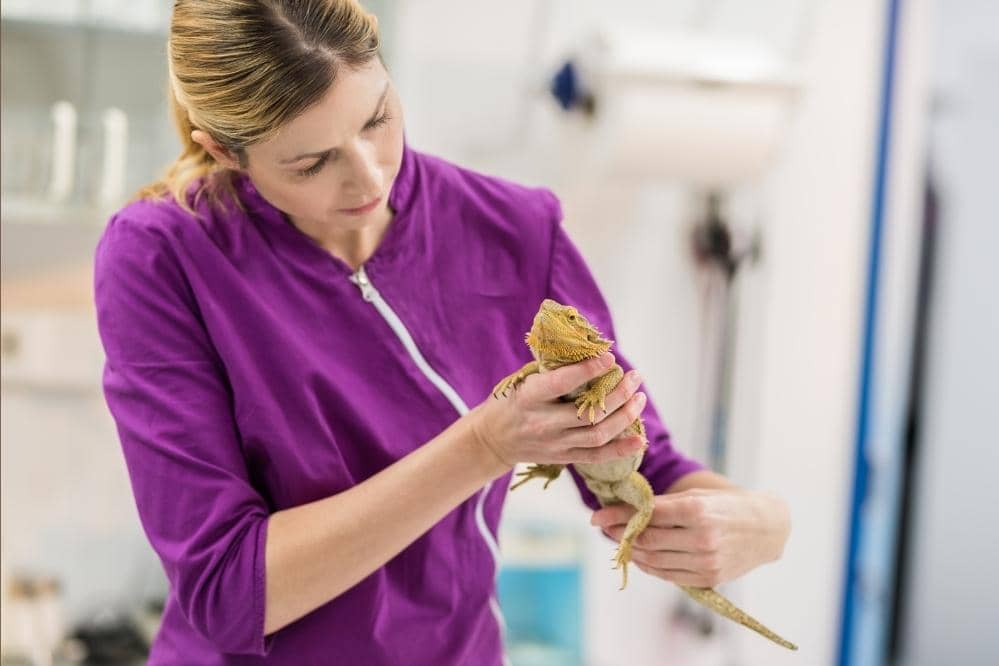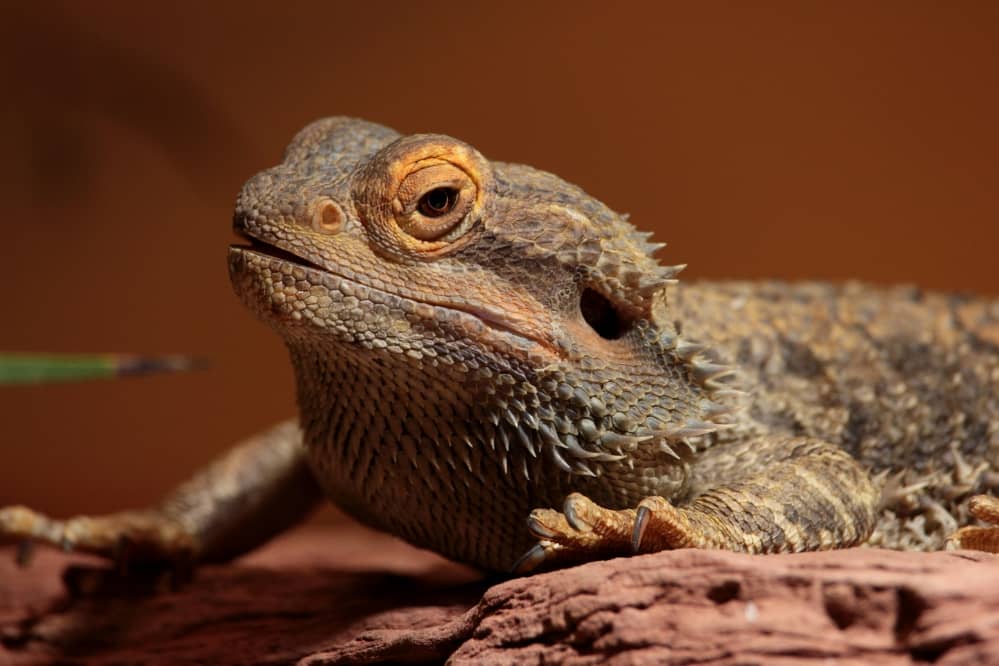In this post, we will try to answer another most commonly asked question by novice bearded dragon owners “can bearded dragons throw up?” In fact, many experienced beardie owners get frightened when they see their bearded friend throwing up.
Yes, bearded dragons can throw up. Vomiting or throwing up is never a good sign however do not panic because it usually does not indicate any serious condition. However, things could be complicated and serious if your bearded dragon is throwing up mucus or blood.
Naturally, now you may be wondering what causes bearded dragons to throw up and how you can reduce the incidences of vomiting or help your bearded friend if he is throwing up. Let’s discuss everything in detail.
7 Causes Of Throwing Up In Bearded Dragons
There are numerous causes for throwing up or vomiting in bearded dragons, ranging from a simple condition (like overfeeding or indigestion) to certain serious conditions (like parasitic infestations). Some common reasons are briefly discussed below.
1. Overeating
Like humans, overeating is one of the most common causes of throwing up in bearded dragons. Generally, beardies can overfeed when you offer more daily meals than recommended or a larger amount of food per meal. In addition, they may also overeat when you offer them their favorite food (e.g., crickets, phoenix worms, etc.).
Related article How Much Should I Feed My Bearded Dragon Daily?
2. Digestion Issues
Digestive issues are the second most common cause of throwing up in bearded dragons. When a beardie is unable to digest its food properly, prolonged stay of food in the intestine can cause vomiting. Many factors can cause digestive issues, like improper temperature and humidity inside the vivarium, the quality, and duration of UVB lights, etc.
3. They Ate Wrong Food
Eating food or something they are not supposed to can also induce vomiting in bearded dragons. For example, if they eat rotten insects or vegetables, or a fruit or vegetable that is not good for them or can’t be digested properly. Furthermore, offering mealworms can also lead to digestive issues and vomiting due to their hard skeleton, which is difficult for most beardies to digest.
4. Impaction Or Constipation
Impaction or constipation can also make your bearded dragon throw up. Many factors (like eating a too-large insect, eating sand, loose substrate, or toxic plants, stress, improper handling, etc.) can lead to impaction. You can easily detect an impacted beardie from its swollen abdomen. However, the first sign that signals impaction is a decrease in the pooping frequency.
5. Dehydration
Though most beardie owners believe beardies can withstand for a long duration without water because they are native to Australian deserts. However, bearded dragons need to drink water regularly to survive and stay healthy. A deficiency of water in the body can also induce vomiting in bearded dragons.
6. Overhydration
In addition to dehydration, overhydration is another issue that can cause a bearded dragon to throw up. Sometimes (especially when the inside temperature is too high), beardies may drink too much water. If you notice that your beardie exhibit tilting and rocking behavior or throws up immediately after drinking water, he may be overhydrated.
7. Higher Infestation Of Parasites (Coccidiosis & Salmonellosis)
Bearded dragons typically contain many parasites in their digestive tract. However, the immune system of a healthy beardie keeps them under control. Sometimes these parasites, especially coccidia (a small parasite found in the intestine of beardies), proliferate and make beardies sick. If your bearded friend is throwing up, irritable, and losing weight without apparent reason, It could be due to parasites and coccidia. In addition, some bacteria like salmonella can also be a reason for throwing up in bearded dragons.
How To Prevent Or Avoid Throwing Up In Bearded Dragons
Some valuable tips are given below to avoid throwing up in bearded dragons.
- The first and most crucial thing to avoid throwing up in bearded dragons is never over-feed your bearded friend. So as a responsible reptile owner, you must know what to feed and how often and much to feed your bearded friend. Generally, baby, juvenile, and adult bearded dragons need 2-3 , two, and one meal daily, respectively. In addition, the amount of food per meal also matters a lot. Generally, a baby and juvenile beardies should not eat more than 50 and 120 crickets in a day (depending on the size of the crickets). While adults should eat up to 40 insects per week. Furthermore, if you are offering fatty worms (like wax worms, super worms, etc.), reduce the number to half for each category. However, remember that these are approximate figures; how much a bearded dragon should eat depends on many factors.
- Feed your bearded dragon the right food, and ensure that the particle size of the food is not too large for your beardie. This thing will help you to avoid impaction and other digestive issues.
- Avoiding dehydration or overhydration is crucial. Ensure clean and cool water is available 24/7 in the tank, and wash water bowl regularly. Continuous water availability also helps to avoid overhydration by keeping your beardie from being greedy when he sees water after an interval. In addition, misting inside the vivarium and bathing your beardie regularly helps keep your bearded friend hydrated.
- Pay special attention to the hygiene of your beardie’s vivarium. If you don’t clean your beardie’s tank regularly, the leftover pieces of fruits, vegetables, or insects will rot. And if your beardie eats these pieces, it can lead to digestive disturbance and vomiting. In addition, regular cleaning prevents the growth of harmful bacteria and fungi.
- Environmental temperature and humidity are essential factors in keeping your bearded friend healthy. So make a habit of regularly checking all the parameters (like temperature, humidity, etc.) are within the recommended range.
What To Do If Your Bearded Dragon If Throwing Up?

As mentioned earlier, if your bearded dragon throws up occasionally, it doesn’t indicate a serious condition. However, if he throws up often or expels mucus or blood, it is a matter of concern and needs immediate action. Whatever the case, take your bearded friend to the vet immediately for professional advice.

